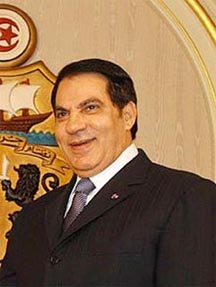Tunis, (Reuters) – Tunisia’s new president announced yesterday he would sell off most of the presidential palaces built by the country’s ousted dictator and use the cash to fund new jobs, a gesture aimed at soothing anger over high unemployment.

Protests demanding jobs and improved living standards toppled President Zine al-Abidine Ben Ali on Jan. 14. The revolution inspired the “Arab Spring” upheavals, but the social problems behind Tunisia’s revolt have since grown worse.
Moncef Marzouki, a political prisoner under Ben Ali, was made president this week as part of a governing coalition brought to power in the country’s first democratic election.
The new government faces the challenge of reviving a spluttering economy and meeting expectations from millions of Tunisians that the revolution, as well as bringing democracy, would improve daily lives in the North African state.
“Moncef Marzouki announced on Friday that the presidential palaces will be sold, with the exception of Carthage Palace, and the money will be allocated to support the employment sector,” the state news agency said.
Ben Ali and his wife, Leila Trabelsi, now in exile in Saudi Arabia, were widely detested for their extravagant lifestyle.
The former president, in power for over two decades, built several luxury palaces, including Sidi Dharif in the Sidi Bou Said district near Tunis, and Hammamet, east of the capital, where he spent his summer vacations.
Local media have reported that Ben Ali spent billions of dollars constructing the palaces, which boast vast grounds with swimming pools and golf courses.
Tunisian courts this year sentenced Ben Ali and his wife, in absentia, to prison terms on charges of financial corruption.
Marzouki, who will serve as president until new elections are held in about one year, has made fighting unemployment and corruption his priorities.
In the months since the revolution, Tunisia has seen violent protests over poor living standards.
